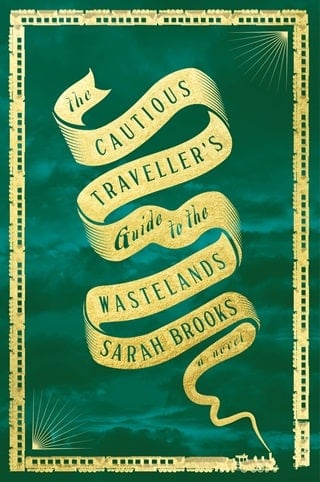Epilogue
From The End of the Cautious Traveller
(Preface, pages i–iv) by Marya Fyodorova
(Mirsky Publishing, Moscow, 1901)
You will know us, of course. The train travels through myth, through the stories that have proliferated as fast as the seedlings that burst up through the paving stones of the cities. You will have seen us caught in the camera's eye, pinned to the pages of the broadsheets or plunging through flickering light on a screen. You will have traced our path across the continents, stopped in your tracks at the sound of rails in the night, listened to all the tales told of us, not knowing what to believe.
It is time for us to tell our own story.
I remember those first months only in a whirl of wonder and horror and disbelief, certain that we would be stopped; just as certain that we were unstoppable. Terrified of what we had released. What would we do, we asked ourselves, when we ran out of rails? But we never did, the earth beneath us made sure of that, we never have, and the new Captain drove us onward, through Europe, into the famous, glittering cities and through fields of lavender and golden wheat. And when we reached the edge of the land we turned to travel a different route, the rails rising up before us, plotting a path across the continent.
I don't pretend to understand what it is we do; I leave the investigation of our many mysteries to the scientists, who study them through the microscope's lens, and to Suzuki Kenji, who maps the changes we bring, though even they have not come close to understanding the rails themselves, in part because they do not last but crumble behind us like bones collapsing into the earth, to be born again, elsewhere. The changes, though, remain. We leave new life in our wake; young vines curling around ancient houses; new shoots stirring in the soil; flora and fauna not found in any of the natural histories so far written. We leave you to find ways to live alongside it, to make the choice that faces us all—whether to turn away from the changes, to fight, to flee; or whether to welcome them in.
It has become part of our legend, that all of us who made that last crossing remained onboard, but that is not quite true—there were some who chose to leave, whose ties to family, land, duty were too strong. Those who were unwilling or unable to give themselves to the train. And there were those whom it tore apart; the wife who hesitated at the door; who, when her husband turned to help her down to the platform, shook her head and said that her place was here, with us, and when her husband raged and tried to reach for her the branches and leaves stopped him, and the train would not have him back. And the previous Captain, who had ridden the train all her life, daring the Wastelands to rise up against her, she stayed with us for a while, then became one of those who settled in Greater Siberia, after the Walls came down, searching for the home her ancestors had lost.
But it is true that many remained, and that more come, every year. Some ride for days, weeks. Some never leave. We grow and change, as everything must.
Of course, there are those who fear us. There are those still loyal to the Company, though it has been broken down, its ruins fought over in the courts and the banking houses. There are those who blame us for the nightmares we released; for the wings and claws and teeth that demand new ways of coexistence. The cleric Yuri Petrovich follows us like a malign shadow. We see his picture in the papers, see him preaching fire and brimstone in city squares and on isolated station platforms. He is indefatigable, and I suppose I admire him for it. His own followers call him a prophet; they flock to him, fearful and eager, longing to believe that he can make sense of a world changing beneath their feet. It is against God, he says. It is an abomination, this train, it must be stopped. The changes must be turned back, the creatures hunted down. And they listen. Young men with their faces hidden behind masks throw burning bottles at the train as we cross over borders; beacons are lit as we pass, to tell the faithful to ready their traps, and there are plenty who heed the call. These Petrovites, as they have come to be called, have tried it all—blockades and dynamite and bullets, and yet the train endures. And yet the creatures they hunt flourish.
I should speak of our Captain. The child of the train, as she once was, as she is still. Those of us who knew her before still see the young girl she was: watchful, clever, always poised for flight. She is different now, of course.
For months, she searched. Everywhere we traveled she watched for signs of Elena, the Wastelands girl she had left behind. This is the part of the story you will not know; that it was because of a stowaway that all this happened, that everything changed. Because of a friendship.
When we first traveled back across Siberia she barely slept, spending her time instead at the windows of the watchtower, certain Elena would hear the call of the train, as she had done all that time ago. We travelled far into the places that no human had seen since the changes began, where eyes opened in the trunks of the birches and shadows moved in the rib cages of fallen animals, as tall as church steeples. We crossed into regions where the land all but sank into water and the rails carried us above glassy surfaces, and in certain light we thought we saw her reflection in the shallows.
There was a longing, a desperation in the Captain in those days. But as the months passed, and we travelled into the new century, we saw a change come over her. She lost the hungry expression we had come to know; she stood taller, at ease in her own skin. She learned to read the land before us, knowing where to guide our path, where the sweetest fruits grew and where clear, pure water rose up from the ground. We would see her, at times, stretching her arms out of the window as if to greet someone waiting on the air. We began to understand, then, that she had found what she was looking for after all; that the Wastelands girl we had known is as much a part of the landscape as the Captain is of the train. We understand that they will never be parted.
I write this at my desk in the Cartographer's tower, my hand long accustomed to moving my pen to the rhythm of the rails. It is morning, and the train is full of life. We picked up new passengers in Nanjing and now we are heading south. The Countess and Vera are preparing the soil in the garden carriage for what new seeds we may find. The Professor is at his printing press. Alexei is teaching the children the workings of the brakes and gears. And Suzuki is at work with his lenses and charts, moving quietly from scope to scope, passing by with a touch on my shoulder or to place a cup of tea on my desk.
Beside me as I write is Valentin Rostov's famous guide. I keep it open at the author's portrait, so that he might see the world he once described now loosened from its bindings. It seems only right that he travels with us, and I believe he understood that it is no longer possible for us to be cautious travellers, only curious ones. I like to think that he would be proud.
All summer we keep the windows open. We breathe in transfigured air. It is not only the landscape that has changed; our own bodies are alive with transformations. I watch as the sunlight catches the new silvery scales on my skin. I lick salt from my lips. I write this book as a way of remembering what we have been, and of finding a way through this new world to what we will be.
Where will the great train take us? We stand at the open windows and we watch the horizon approaching.
 Fullepub
Fullepub 



